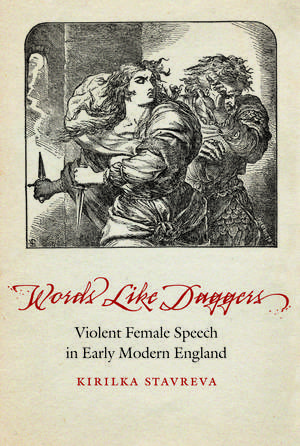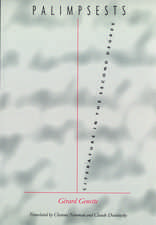Words Like Daggers: Violent Female Speech in Early Modern England: Early Modern Cultural Studies
Autor Kirilka Stavrevaen Limba Engleză Paperback – 28 feb 2017
Dramatic and documentary representations of aggressive and garrulous women, while often casting such women as reckless and ultimately unsuccessful usurpers of cultural authority, simultaneously highlight, in contending narrative lines, their effective manipulation and even subversion of social and gender hierarchies. Words Like Daggers explores the scolding invectives, malevolent curses, and ecstatic prophesies of early modern women as attested in legal documents, letters, self-narratives, popular pamphlets, ballads, and dramas of the era. By examining the framing and performance of such violent female speech between the 1590s and the 1660s, Kirilka Stavreva dismantles the myth of the silent and obedient women who allegedly populated early modern England.
Blending gender theory with detailed historical analysis, Words Like Daggers highlights the capacity of women’s language to shape gender and social relationships in the early modern era. Stavreva not only reconstructs the speech acts of individual contentious women but also examines the powerful performative potential of women’s violent speech, revealing how the stage, arguably the most influential cultural institution of the Renaissance, orchestrated and aestheticized women’s fighting words and, in so doing, showcased and augmented their cultural significance.
Blending gender theory with detailed historical analysis, Words Like Daggers highlights the capacity of women’s language to shape gender and social relationships in the early modern era. Stavreva not only reconstructs the speech acts of individual contentious women but also examines the powerful performative potential of women’s violent speech, revealing how the stage, arguably the most influential cultural institution of the Renaissance, orchestrated and aestheticized women’s fighting words and, in so doing, showcased and augmented their cultural significance.
| Toate formatele și edițiile | Preț | Express |
|---|---|---|
| Paperback (1) | 180.44 lei 43-57 zile | |
| Nebraska – 28 feb 2017 | 180.44 lei 43-57 zile | |
| Hardback (1) | 391.46 lei 43-57 zile | |
| Nebraska – 31 dec 2014 | 391.46 lei 43-57 zile |
Preț: 180.44 lei
Nou
Puncte Express: 271
Preț estimativ în valută:
34.53€ • 36.15$ • 28.57£
34.53€ • 36.15$ • 28.57£
Carte tipărită la comandă
Livrare economică 07-21 aprilie
Preluare comenzi: 021 569.72.76
Specificații
ISBN-13: 9780803295865
ISBN-10: 0803295863
Pagini: 230
Ilustrații: 3 illustrations, 1 index
Dimensiuni: 152 x 229 x 17 mm
Greutate: 0.34 kg
Editura: Nebraska
Colecția University of Nebraska Press
Seria Early Modern Cultural Studies
Locul publicării:United States
ISBN-10: 0803295863
Pagini: 230
Ilustrații: 3 illustrations, 1 index
Dimensiuni: 152 x 229 x 17 mm
Greutate: 0.34 kg
Editura: Nebraska
Colecția University of Nebraska Press
Seria Early Modern Cultural Studies
Locul publicării:United States
Notă biografică
Kirilka Stavreva is a professor of English at Cornell College. Her work has been anthologized in High and Mighty Queens of Early Modern England: Realities and Representations; Women, Gender, Radical Religion; Cultural Encounters: Critical Insights; and elsewhere.
Cuprins
List of Illustrations
Acknowledgments
Introduction: Bitter Words and the Tuning of Gender
1. Feminine Contentious Speech and the Religious Imagination
2. Gender and the Narratives of Scolding in the Church Courts
3. Unquiet Women on the Early Modern Stage
4. Witch-Speak in Late Elizabethan Docufiction
5. Courtly Witch-Speak on the Jacobean Stage
6. Gender and Politics in Early Quaker Women’s Prophetic “Cries”
Epilogue: Margaret’s Bitter Words and the Voice of (Divine) Justice, or, Compulsory Listening
Notes
Bibliography
Index
Recenzii
“Stavreva powerfully contributes to our understanding of the nature of women's violent speech by attending not only to what women say, but how they say it. Most original here is her focus on the acoustics of women's speech and its embodied physicality.”—Deborah Willis, Renaissance Quarterly
“Stavreva’s book furthers the work of many feminist scholars, contributes to women’s history, and advances our understanding of the early modern culture in its textual, sonic, and even physical manifestations.”—Anna Riehl Bertolet, author of The Face of Queenship: Early Modern Representations of Queen Elizabeth I































